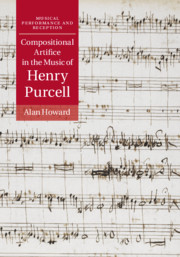
-
Select format
-
- Publisher:
- Cambridge University Press
- Publication date:
- September 2019
- October 2019
- ISBN:
- 9781139030458
- 9781107006669
- Dimensions:
- (247 x 174 mm)
- Weight & Pages:
- 0.8kg, 312 Pages
- Dimensions:
- Weight & Pages:
- Subjects:
- Seventeenth-Century Music, Music, Music Performance
You may already have access via personal or institutional login- Subjects:
- Seventeenth-Century Music, Music, Music Performance
Book description
Fugal invention has proved a successful line of analytical inquiry in recent studies of repertoires from Josquin to J. S. Bach. Alan Howard brings similar insights to the music of Henry Purcell, and proposes the first analytical approach to his music to examine compositional methods alongside historically contemporary theory, focusing particularly on Purcell's 'artificial' approach to imitative counterpoint. Through this methodology Howard challenges previous responses to Purcell's music that portrayed him as fundamentally conservative. This study offers fresh insights into the musical world in which Purcell lived and worked and situates Purcell's compositional concerns in the broader context of notions of artifice in Restoration culture. Howard thereby offers both a fresh analytical approach - to Purcell's early instrumental works and to his later concerted vocal music - and a critique of the reception history surrounding the fantazias and sonatas in particular.
Reviews
'This book documents a remarkable achievement. It not only offers direct insights into the creative processes of a great composer on a technical level, but also succeeds in getting, as it were, into his skin as he faced compositional problems - something not previously attempted in the case of Purcell (and all too rarely accomplished for any composer).'
Bruce Wood - Bangor University
'Compositional Artifice in the Music of Henry Purcell represents a step-change in the emerging musicological sub-discipline of historically informed analysis. By introducing the contemporary notion of ‘artificial’ composition - in which the composer incorporated intricate imitative devices to provide creative satisfaction for both composer and performer - Howard unravels with remarkable clarity the hidden compositional techniques lying behind Purcell’s inventive strategies in both his instrumental chamber music and his later large-scale vocal works. The book provides a set of historically sensitive analytical tools that have the potential to transform the reader’s understanding of some of Purcell’s greatest masterpieces.'
Rebecca Herissone - University of Manchester
Contents
Metrics
Full text views
Full text views help Loading metrics...
Loading metrics...
* Views captured on Cambridge Core between #date#. This data will be updated every 24 hours.
Usage data cannot currently be displayed.
Accessibility standard: Unknown
Why this information is here
This section outlines the accessibility features of this content - including support for screen readers, full keyboard navigation and high-contrast display options. This may not be relevant for you.
Accessibility Information
Accessibility compliance for the PDF of this book is currently unknown and may be updated in the future.

